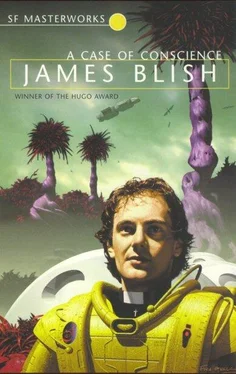Ruiz-Sanchez checked the door hastily. It had elaborate locks—left over from the last period of the Shelter race, when the great untended buildings had been natural targets for looters—but they had gone unused for years. Ruiz-Sanchez used them all now.
He was just in time. There was an obscene shouting in the corridor just outside as part of the mob burst into it from the fire stairs. They had avoided the elevator by instinct—it was too slow to sustain their thoughtless ferocity, too confined for lawlessness, too mechanical for men who were letting their muscles do their thinking.
Somebody rattled the door knob and then shook it.
“Locked,” a muffled voice said.
“Break the damned thing down. Here, get out of the way—”
The door shuddered, but held easily. There was another, harder thump, as though several men had lunged against it at the same time; Ruiz-Sanchez could hear them grunt with the impact Then there were five hammerlike blows.
“Open up in there! Open up, you lousy government fink, or we’ll burn you out!”
The spontaneous threat seemed to surprise them all, even the utterer. There was a confused whispering. Then someone said hoarsely: “All right, but find some paper or something.” Ruiz-Sanchez thought confusedly of finding and filling a bucket, though he could not see how any fire could be introduced around the door—there was no transom, and the sill was snug—but at the same time a blurred shout from farther down the hall seemed to draw everyone outside stampeding away. The subsequent noises made it clear that they had found either an open, empty apartment, or an inadequately secured, occupied one where nobody was at home.
Yes, it was occupied; Ruiz-Sanchez could hear them breaking furniture as well as windows.
Then, with a shock of terror, their voices began to come at him from behind his back. He whirled, but there seemed to be nobody in the apartment; the shouting was coming from the glassed-in sun porch, but of course there was nobody out there either—
“Jesus! Look, the guy’s got his porch glassed in. It’s a goddam garden.”
“They don’t let you have no goddam gardens in the Shelters.”
“And you know who paid for it. Us, that’s who.”
He realized that they were on the neighboring balcony. He felt a surge of relief which he knew to be irrational. The next words confirmed its irrationality.
“Get some of that kindling out here, “No, heavier stuff. Something to throw, you meathead.”
“Can we get over there from here?”
“If we could throw a ladder across there—”
“It’s a long way down—”
The leg of a chair burst through the glass on the sun porch. A heavy vase followed.
The bees came pouring out. Ruiz-Sanchez had not realized how many of them there were. The porch was black with them. For a moment they hovered uncertainly. They would have found the gaps in the glass almost at once in any event, but the men on the next porch, who could not have understood what it was they were seeing, gave the great insects the perfect cue. Something small and massive, possibly a torn-off piece of plumbing, shattered another pane and whirled through the midst of the cloud. Snarling like an old-fashioned aircraft engine, the bees swarmed.
Ruiz-Sanchez pushed at it, but it was partly locked. He got it open about six inches and wormed through.
The contorted man on the floor, his incredibly puffed, taut skin slowly turning black, his eyes glassy with agony, was Agronski.
The geologist did not recognize him; he was already beyond that. There was no mind behind the eyes. Ruiz-Sanchez fell to his knees, clumsily in the tight protective clothing. He heard himself begin to mutter the rites, but he was no more hearing the Latin words than Agronski was.
This could be no coincidence. He had come here to give grace, if such a one as he could still give grace; and before him was the most blameless of the Lithian commission, struck down where Ruiz-Sanchez would be sure to find him. It was the God of Job who was abroad in the world now, not the God of the Psalmist or the Christ. The face that was bent upon Ruiz-Sanchez was the face of the avenging, the jealous God—the God who made hell before He made man, because He knew that He would have need of it. That terrible truth Dante had written down; and in the black face with the protruding tongue which rolled beside Ruiz-Sanchez’ knee, he saw that Dante had been right, as every Catholic who reads the Divine Comedy knows in his heart of hearts.
There is a demonolater abroad in the world. He shall be deprived of grace, and then called upon to administer extreme unction to a friend. By this sign, let him know himself for what he is.
After a while, Agronski was dead, choked to death by his own tongue. But still it was not over. It was necessary now to make Mike’s apartment secure, kill any bees that might have got in, see to it that the escaped swarm died. It was easy enough. Ruiz-Sanchez simply papered over the broken panes on the sun porch. The. bees could not feed anywhere but in Liu’s garden; they would come back there within a few hours; denied entrance, they would die of starvation an hour or so later. A bee is not a well-designed flying-machine; it keeps itself in the air by expending energy, in short, by pure brute force. A trapped bumblebee can starve to death in half a day, and Liu’s tetraploid monsters would die far sooner of their freedom…
The 3-V muttered away throughout the dreary business. The terror was not local, that was clear. The Corridor Riots of 1993 had been nothing but a premonitory flicker, compared to this.
Four target areas were blacked out completely. Egtverchi’s uniformed thugs, suddenly reappearing from nowhere in force, had seized the control centers. At the moment, they were holding roughly twenty-five million people as hostages for Egtverchi’s safe-conduct, with the active collusion of perhaps five million of them. The violence elsewhere was not as systematic, though some of the outbursts of wrecking must have been carefully planned to allow for the placing of the explosives alone, there seemed to be no special pattern to it—but in no case could it be described as “passive” or “non-violent.”
Sick, wretched and damned, Ruiz-Sanchez waited in the Michelises’ jungle apartment, as though part of Lithia had followed him home and enfolded him there.
After the first three days, the fury had exhausted itself sufficiently to permit Michelis and Liu to risk the trip back to their apartment in a UN armored car. They were wan and ghastly-looking, as Ruiz-Sanchez supposed he was himself; they had had even less sleep than he had. He decided at once to say nothing about Agronski; that horror they could be spared. There was no way, however, that he could avoid explaining what had happened to the bees.
Liu’s sad little shrug was somehow even harder to bear than Agronski.
“Did they find him yet?” Ruiz-Sanchez said huskily.
“We were going to ask you the same thing,” Michelis said. The tall New Englander was able to get a glimpse of himself in a mirror above a planting box and winced. “Ugh, what a beard! At the UN everybody’s too busy to tell you anything, except in fragments. We thought you might have heard an announcement.”
“No, nothing. The Detroit vigilantes have surrendered, according to QBC.”
“Yes, so have those goons in Smolensk; they ought to be putting that on the air in an hour or so. I never did think they’d succeed in pulling that operation off. They can’t possibly know the corridors as well as the target area authorities themselves do. In Smolensk they got them with the fire door system—drained all the oxygen out of the area they were holding without their realizing what was going on. Two of them never came to.”
Читать дальше











